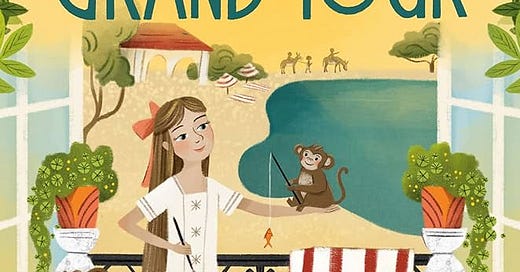Hi, friends,
I’ve been quiet again due to general brainmelt—in addition to the library continuing to be bananas, this is the third year of my self-inflicted 61 Horror Movies in 61 Days challenge, and I’m up to 53 with only two days left. So it’s extremely doubtful that I’ll hit 61, but 53 is not too shabby! I’ll pull together a round-up of my faves sometime next month.
In re: last week’s mass shooting up here. We’re okay, our families—some of whom were in the lockdown areas—are okay. Shaken, for sure, but okay. While I’ve seen a lot of “we didn’t think it could happen here” in the national coverage, that’s definitely not an across-the-board reaction from Mainers—many of us were more of the “it wasn’t if, it was when” mindset. Gun violence and untreated mental illness don’t stop at the state line.
“Maybe this is the first time she has ever been able to truly be herself. Now the question is: what happens when she goes back to New York? It’s all well and good to be happy and free when you are far away from home, on a blissful summer holiday. The question is how you bring happiness and freedom back with you.”
—Alice Atherton’s Grand Tour, by Lesley M. M. Blume
New York City, 1927. Ten-year-old Alice Atherton has been in a gray haze since the death of her mother. Concerned—though he’s also grieving himself—her father packs her up and sends her to France to spend the summer with beloved family friends, the rambunctious and unorthodox Murphy family.
Once there, she is treated to multiple once-in-a-lifetime experiences: lessons from some of the most celebrated artists of her time, including Picasso, Hemingway, the Ballet Russes, and F. Scott and Zelda Fitzgerald. It’s a gentle, warm book about coming to terms with great loss, seeing the wonder in simple things, finding joy in everyday life; it’s about friendship, family, and treating ourselves and one another with compassion, care, and grace.
It’s a historical that will appeal to folks looking for an Olde Fashioned Romp along the lines of The Penderwicks or a Big Quirky Family Romp like the Vanderbeekers series. In other words: Gently exuberant, and heartwarming without being weepy. It’ll also appeal to readers who tend towards golden-hazy-nostalgia-as-comfort-reading stories, which is an area that can get super dicey. I’ll get into that a little more below.
“Come quick— they’re here, they’re here!” he shouted. “They’re early. Signor Sella is practically having a heart attack. All of the dancers are arriving on boats behind the hotel.”
The children ran out onto the hotel’s back terrace just as three motorboats approached the hotel’s long dock jutting out from the rocky cliff. Each boat held four or five people, and each person held up high above his or her head a large, brightly colored silk scarf that whipped in the wind high into the air. It was one of the most astonishing sights that Alice had ever seen: the scarves looked to her like scarlet, yellow, blue, and green flames flickering up into the sky.
—Alice Atherton’s Grand Tour, by Lesley M. M. Blume
Will I always link to this when I am reminded of it? Yes, yes, a million times yes.
On Alice Atherton and Golden Hazy Nostalgia
So, obviously, looking at The Past through rose-colored glasses—celebrating the fashion and food and fascinating personalities and other various delights while fully ignoring things like voting rights, anti-miscegenation laws, and the vast differences in daily life depending on identity and economic status—is something that we do a LOT. Was life in the 1920s pretty rad for a lot of rich, white people? YEP. Was it pretty rad for everyone else? Well… there’d have certainly been less free time and fewer opportunities to wear diamonds, drink endless bottles of champagne, and do the Charleston. Let alone, you know, go to school or get your own bank account or publicly acknowledge the person you love or look sideways at someone being an asshat without being murdered.
Blume makes a real effort to comment on some of the era-specific stuff that doesn’t read so comfortably in 2023—one of the kids mouths off to Hemingway about how gross bullfighting is, for example, and Mrs. Murphy refers to Coco Chanel as a “beastly woman.” And I particularly appreciated how she tied Sergei Diaghilev’s grief about being exiled from his home country to Alice’s grief about losing her mother. It’s deftly done, and it’s honest about how grief never entirely fades. It also encourages the reader to think about historical figures as actual human beings who had emotions, AND it shows that even though our own personal losses are all different, there are commonalities, too—that they can be sources of connection if we so choose.
Where I really struggled, though, was the economic piece. The life that the Murphys lead is depicted as idyllic and delightful, and again and again, Blume shows the kids eating sun-warmed fruit and vegetables straight from the gardens and orchards. Which is LOVELY.
HOWEVER. I could NOT stop thinking about how much work it would take to maintain all of it, and as far as I could tell, none of it was being done by the Murphys. While there is mention of a gardener and a maid, I just couldn’t get past the image of this whole army of workers laboring behind the scenes to create the illusion of simplicity for this small group of affluent people.
Compounding that, there’s a whole bit during Hemingway’s visit where the kids are reading about Marie Antoinette and the bonkers feasts eaten by the French royals, which leads to this:
“We will also learn about how the most seemingly simple and common things can also be the most precious things in the world,” Mr. Hemingway said. “Like sunshine, and rain, and dirt in the garden, and the sea.”
But all I could think was BUT THEY’RE KIND OF DOING THE SAME THING THAT MARIE DID WITH HER LITTLE FARM, SO IT’S KINDA RICH FOR THEM TO TAKE POTSHOTS AT HER??? (pun not intended, but i’m leaving it)
There was also a bit played for sweetness and warmth where the kids go into town and talk the local baker into baking them up some treats EVEN THOUGH SHE’S ON VACATION and I dunno, it made me think that while they were being taught some really great lessons about Living In The Moment and Appreciating Nature and Celebrating Art, that these kids should MAYBE be reminded that some people have to work for a living and maybe bakers don’t want to bake WHILE THEY’RE ON VACATION, let alone when it’s 90 bajillion degrees out.
I know, I know: Leila Roy, FUN POLICE.
[Note! The Murphys were real people who—from what I learned from the backmatter and Wikipedia—appeared to have been just as charming and well-meaning as they are in this book, and who certainly dealt with plenty of tragedy. The bakery story very well might be something that actually happened; I’m really not dinging the book for it, but these are the things that occur to me when I’m reading.]
Mr. Hemingway gutted and scaled the caught fish, cut it up, and then speared them on thick sticks and created little spits for them over the fire. When the fish were cooked, Mr. Murphy cut up fresh lemons with his pocketknife and squeezed them over the fillets. The children roasted potatoes over the fire on long sticks and bit into tomatoes like apples. Alice had never tasted anything so delicious, not even the butter cakes in the town square.
—Alice Atherton’s Grand Tour, by Lesley M. M. Blume
While I had issues with how the Murphy lifestyle was depicted as simple and whatnot, I really did love this passage—and reading it again just now make my stomach growl.
More Middle Grade Historicals
Other Recent Middle Grade Reads
Camp Sylvania, by Julie Murphy
Felicia the Critic, by Ellen Conford
Dreams of Victory, by Ellen Conford
Hither & Nigh, by Ellen Potter
And finally, I will leave you with this video, which is a pretty accurate depiction—the fighting, not the mating—of what’s been going on in our backyard lately:
Hope you’re well,
Leila








A simple lifestyle is so often simple because other people are taking care of all the complicated things like food production! Are we maybe supposed to *notice* that Hemingway is not noticing that they're all doing Marie Antoinette stuff? Maybe not. And I suppose the real Murphys actually hung out with all these famous people but it seems to me that a grieving ten year old could have a normal summer in France and that would be plenty without all the celebrities who IRL were probably too busy drinking to give lessons to ten year olds, but evidently I am also fun police.
I wonder if journalists automatically fall back on 'we never thought it could happen here' cliches even when everybody knew it could, just because...humans and shock and how humans deal with shock. I'm so sorry you all had to go through that.
Our plan this year is to watch the Halloween episodes of MacGyver in between doorbell rings. Hope yours is good!
Glad to hear the horror is confined mainly to movies for you right now.
Alice Atherton's Grand Tour looks like a darling book, the sort of book which needs full-color illustrations so you can see all the European stuff historically (have you yet read Dan Santat's book - all those lovely sketches!) but the conceit is a lot like Forrest Gump for me... though, at least nothing "historical" seems to happen while Alice is around. .. although Zelda and Scott Fitzgerald top my list of Toxic, Narcissistic People I Wouldn't Allow Around My Kids. Yikes.